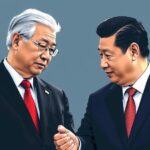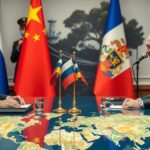Politics
AMERICA, ASIA, BEIJING, CENTER, CHINA, CHINA PROGRAM, CNN, DAVOS, DONALD TRUMP, EUROPE, EUROPE/ASIA, FOREIGN POLICY, GEOPOLITICS, GERMANY, INTERNATIONAL RELATIONS, MEXICO, MUNICH, NORTH AMERICA, PUTIN, RUSSIA, STIMSON, STIMSON CENTER, SWITZERLAND, TRUMP, UKRAINE, UNITED STATES, US, US-CHINA RELATIONS, VLADIMIR PUTIN, WASHINGTON, WORLD ECONOMIC FORUM, XI, XI JINPING, YUN SUN
Sophia Klein
Trump’s Call for China’s Involvement in Ukraine Peace Efforts
Former President Trump has identified Chinese President Xi Jinping as a potential mediator for peace in Ukraine. Despite trade tensions, the ongoing conflict presents a unique opportunity for U.S.-China cooperation. However, China’s close ties with Russia complicate this scenario. The upcoming Munich Security Conference will serve as a platform for further discussions on the situation and U.S. aid to Ukraine.
As the conflict in Ukraine nears its fourth year, former President Donald Trump has identified Chinese President Xi Jinping as a crucial player in facilitating peace. During the World Economic Forum in Davos, Trump expressed optimism that China, given its significant influence, could assist in resolving the Russia-Ukraine situation. This perspective was echoed in a recent conversation he had with Xi prior to assuming office as President.
Trump’s plans for collaboration may be complicated by his recent imposition of a 10% tariff on Chinese imports. However, the ongoing war in Ukraine presents a unique opportunity for cooperation, especially as Beijing seeks to mitigate trade tensions with the United States. Yun Sun of the Stimson Center believes that if Trump frames China’s support as essential for improved relations, Beijing may consider playing a constructive role.
China has positioned itself as a potential mediator in the Ukraine crisis, yet its close ties with Russia pose risks to such aspirations. Analysts indicate that Xi’s partnership with Putin is vital for China’s broader strategic objectives, which involve countering Western influence. A weakened Russia is not in China’s best interest, as it would lose a key ally in international affairs.
The upcoming Munich Security Conference will feature discussions on the conflict, with both U.S. and Chinese representatives in attendance. Trump’s administration has adopted a critical stance on American aid to Ukraine, contrasting sharply with earlier commitments by his predecessor, Joe Biden. The shift raises concerns regarding U.S. support for Ukraine’s sovereignty and the international order.
Despite expressing a desire for a swift resolution, Trump’s team has yet to articulate explicit peace terms. This ambiguity complicates potential negotiations with China. Previous attempts by Western leaders to persuade Xi to influence Putin have yielded limited success, given China’s role as a critical economic lifeline for Russia throughout the war.
China’s foreign policy calculations suggest it is unlikely to jeopardize its relationship with Russia, particularly against the backdrop of rising tensions with the West. As Beijing observes the war’s impact on U.S. focus towards Asia and Taiwan, Xi’s policies may be influenced by geopolitical considerations related to Taiwan’s status.
If Trump and Xi were to collaborate in pressuring Putin for negotiations, it would signify a major departure from Beijing’s current stance on the conflict. Some analysts argue that this approach could align with China’s goal of promoting an alternative global order, countering U.S. influence. However, it remains unclear what specific benefits China may perceive from engaging with Trump for a peace settlement.
Trump’s position on the conflict, which includes respecting Russia’s interests and questioning Ukraine’s NATO aspirations, could make him a more attractive partner for Xi. Experts speculate that any possible agreement might allow all parties involved to claim success, despite risks of a prolonged conflict if Russia retains control over occupied territories. This dynamic underscores the complex interplay between diplomacy and power in resolving the ongoing crisis in Ukraine.
In summary, Trump’s expectation for China to mediate peace in Ukraine reflects significant geopolitical dynamics between the U.S., China, and Russia. Trump’s previous actions may complicate collaboration, yet the conflict offers a possible avenue for improved relations. China’s careful balance between its support for Russia and potential cooperation with the U.S. highlights the intricate nature of international diplomacy. The outcomes of discussions at the Munich Security Conference could shape the future of U.S.-China relations in this context.
Original Source: www.cnn.com








Post Comment